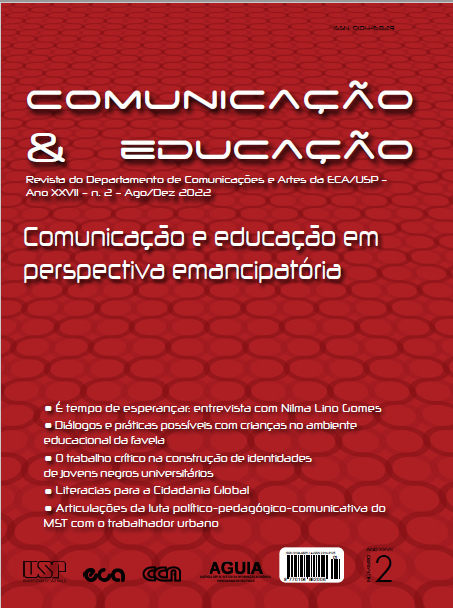Ciências da Comunicação contra a desinformação
DOI:
https://doi.org/10.11606/issn.2316-9125.v27i2p5-19Keywords:
information, disinformation, superindustry of the imaginary, democracy, factual truth, fascismAbstract
From the understanding of information, not only through the etymology, but through the history of the social use of the term, I try to develop the concept of disinformation. More than rumours, more than a fuse of lies, disinformation, in my view, should be seen as a toxic by-product of the Superindustry of the Imaginary, jeopardizing democratic normality and boosting discourses with fascist traits. If information helps to weave bonds of trust in the public sphere, disinformation dissolves those bonds. In the framework of the Superindustry of the Imaginary – a stage of capitalism in which the value of the commodity’s image surpasses the value of the commodity’s body – communication is no longer an accessory activity (at the service of public or private organizations) to become the center of economic and political activity, defining the status of disinformation – a communicational pattern that compresses thought and verification of facts in favor of libidinal identifications, passions and desire. This is so true that global monopoly conglomerates (big techs such as Meta, Apple or Alphabet) reach the highest market values in history, in the trillions of dollars.
Downloads
References
ADORNO, T.W. “A Teoria Freudiana e o Padrão da Propaganda Fascista” (original de 1951). In: Margem Esquerda. #7. São Paulo: Editora Boitempo, 2006. Tradução de Gustavo Pedroso. Disponível em: https://blogdaboitempo.com.br/2018/10/25/adorno-a-psicanalise-da-adesao-ao-fascismo/
ARENDT, Hannah. “Verdade e Política”. In: Entre o Passado e o Futuro. Tradução de Manuel Alberto. Lisboa: Relógio D’Água Editores, 1995. Disponível em: https://abdet.com.br/site/wp-content/uploads/2014/11/Verdade-e-pol%C3%ADtica.pdf
BUCCI, Eugênio. “A confusão que favorece a tirania”. In: O Estado de S. Paulo, 24 mar. 2022. Disponível em: https://opiniao.estadao.com.br/noticias/espaco-aberto,a-confusao-que-favorece-a-tirania,70004017550
BUCCI, Eugênio. A Superindústria do Imaginário – Como o Capital Transformou o Olhar em Trabalho e Se Apropriou de Tudo Que É Visível. Belo Horizonte: Autêntica, 2021.
BUCCI, Eugênio. Existe Democracia sem Verdade Factual?. São Paulo: Estação das Letras e Cores, 2019.
CAPURRO, Rafael; HJORLAND, Birger. O Conceito de Informação. Perspectivas e Ciência da Informação, v. 12, nº 1, p. 148-207, jan./abr. 2007.
CARDOSO, Matêus Ramos. “O Desencantamento do Mundo Segundo Max Weber”. Revista EDUC - Faculdade de Duque de Caxias, vol. 01- nº 02/jul-dez 2014.
CASTRO ROCHA, João Cezar de. Guerra Cultural e Retórica do ódio: Crônicas de um Brasil Pós-político. Rio de Janeiro: Caminhos Editora e Livraria. 2021.
CNBC. “Apple becomes first U.S. company to reach $3 trillion market cap”. CNBC, 3 jan 2022. Disponível em: https://www.cnbc.com/2022/01/03/apple-becomes-first-us-company-to-reach-3-trillion-market-cap.html.
DANTAS, Marcos [et al.]. O Valor da Informação: De Como o Capital Se Apropria do Trabalho Social na Era do Espetáculo e da Internet. São Paulo: Boitempo, 2022.
DICIONÁRIO OXFORD. Ver em: https://languages.oup.com/word-of-the-year/2016/ Ver também: https://www.oxfordlearnersdictionaries.com/definition/english/post-truth. Consultado em 31 jul 22.
ECO, Umberto. O Fascismo Eterno. Rio de Janeiro: Record, 2019. Tradução de Eliana Aguiar, 2ª ed.
FREUD, S. Psicologia das Massas e Análise do Eu e Outros Textos. São Paulo: Companhia das Letras, 2011. Tradução de Paulo César Souza. Edição Eletrônica. Kindle.
HABERMAS, Jürgen. Between Facts and Norms. Cambridge: MIT Press, 1992.
HABERMAS, Jürgen. Mudança Estrutural da Esfera Pública. Rio de Janeiro: Tempo Brasileiro, 1984.
HITLER, Adolf. Mein Kampf, edição em português, disponível na internet, p. 170. Ver https://ia800702.us.archive.org/23/items/meinkampf_minha_luta/por.pdf. Há uma edição, mais rara, impressa no Brasil. HITLER, Adolfo. Minha Luta. São Paulo: Editora Mestre Jou, 8ª Edição.
NASCIMENTO, Milton Meira do. Opinião Pública e Revolução. São Paulo: Edusp/ Nova Stella, 1989.
PIERUCCI, A. F. O Desencantamento do Mundo: Todos os Passos do Conceito em Max Weber. São Paulo: 34, 2003.
PIMENTA, Angela. “Claire Wardle: Combater a Desinformação é como Varrer as Ruas”. Observatório da Imprensa, 14 nov. 2017. Disponível em: https://www.observatoriodaimprensa.com.br/credibilidade/claire-wardle-combater-desinformacao-e-como-varrer-as-ruas/
SALMON, Felix. “Giant earnings growth for the world’s largest companies.” Axios, 29 jul. 2021. Disponível em: https://bit.ly/3AVNDeF.
SHANNON, Claude E.; WEAVER, Warren. The Mathematical Theory of Communication. The University of Illinois Press. Urbana, 1964.
SULLIVAN, Margaret. “Russia’s new control tactic is the one Hannah Arendt warned us about 50 years ago”. In: The Washington Post, 11 mar. 2022. Disponível em: https://www.washingtonpost.com/media/2022/03/11/hannah-arendt-putin-disinformation/
THE ECONOMIST. “Art of the lie: Post truth politics in the age of social media”. The Economist, 10 set. 2016.
WARDLE, Claire. “Understanding Information Disorder”. First Draft, september 22, 2020. Disponível em: https://firstdraftnews.org/long-form-article/understanding-information-disorder/
WEBER, Max. Ética Protestante e o Espírito do Capitalismo. São Paulo: Companhia das Letras, 2004.
WURMAN, Richard. Ansiedade de Informação: Como Transformar Informação em Compreensão. São Paulo: Cultura Editores Associados, 1991.
Downloads
Published
Issue
Section
License
Copyright (c) 2022 Eugenio Bucci

This work is licensed under a Creative Commons Attribution 4.0 International License.
I authorize the publication of the submitted article and soon the copyrights to the magazine, in the printed and electronic version, if it is approved after the evaluation of the reviewers.
I understand that readers may use this article without prior request, provided the source and authorship are mentioned. Readers are not authorized to use this article for reproduction, in whole or in part, for commercial purposes.

































